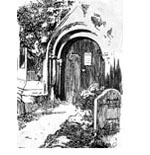
A Journey to the Threshold of Eternal Life
ON THE PAINFUL ROAD OF SPIRITUAL PURIFICATION
In June 2012, I welcomed my frail, elderly mother to live with me in the parish rectory for the last years of her life. She was hobbled by chronic back pain and becoming weaker by the day. In the challenge of caring for her, the paradox of the Cross was laid out before me, and I came to understand more deeply the words of St. Paul, “In weakness, power reaches perfection” (2 Cor. 12:9).
This, of course, is a counterintuitive message in a world that trumpets productivity, autonomy, and vitality as the indispensable elements of the human experience. The job of caring for an 85-year-old woman who struggles to get around in a walker is a thankless and dreary job, something odious and even illogical in our success-driven society, where putting the sick and elderly out of sight and out of mind in convalescent homes is the easy and obvious solution. This Western view comes as a shock to the people of Africa, who hold the elderly in great esteem. As Robert Cardinal Sarah of Guinea explains, “This tendency to hide old age and marginalize it is the sign of a worrisome selfishness, heartlessness, or, more accurately, hardheartedness” (God or Nothing).
Sacred Scripture repeatedly stresses the importance of assisting the poor, the widow, and the orphan — the most vulnerable and needy in our midst. In caring for them, in listening to them, in spending time with them, we minister to Christ the Suffering Servant. We begin to touch Jesus when we touch them, heal Jesus when we heal them, console Jesus when we console them. In doing so, we who are fit and healthy, comfortably self-sufficient, and all too often possess more wealth than we need, come to realize that we too are really nothing, that we are dependent on almighty God for our very existence, for every breath we take. Our masks of self-sufficiency and autonomy are stripped away, and we discover how much of our lives are built on the quicksand of illusion. The realization comes that the Gospel is lived out in the little things, as spelled out by St. Thérèse of Lisieux, the Little Flower, who taught the importance of performing small acts with great love and patience. These little offerings become celebrations of love, fragrant bouquets offered to the Lord. It happens in the hiddenness of day-to-day life, without fanfare and publicity, without applause from those around us.
+++
The glory of the suffering Christ shone forth in my mother’s suffering and humiliation. The Gospel testifies that Christ’s glory shines brightest not in His miracles, His expulsion of demons, or His powerful words, but in His humiliation and suffering. This is the paradoxical greatness of our God. As St. Paul writes, “God chose those who by human standards are fools to shame the wise; he chose those who by human standards are common and contemptible — indeed those who count for nothing — to reduce to nothing all those who count for something, so that no human being might feel boastful before God” (1 Cor. 1:27-29).
You May Also Enjoy
Sustained national discussion of taboo topics like contraception and Planned Parenthood have yielded valuable 'teaching moments' and surprisingly countercultural essays in some mainstream venues.
Almost all abortion ideologues refuse to address the core question: Is the unborn child a fellow member of the human family, one to whom we owe love, life, and justice?
The Church celebrates and proclaims publicly some very private human activities that might well cause some folks to feel a bit squeamish.

